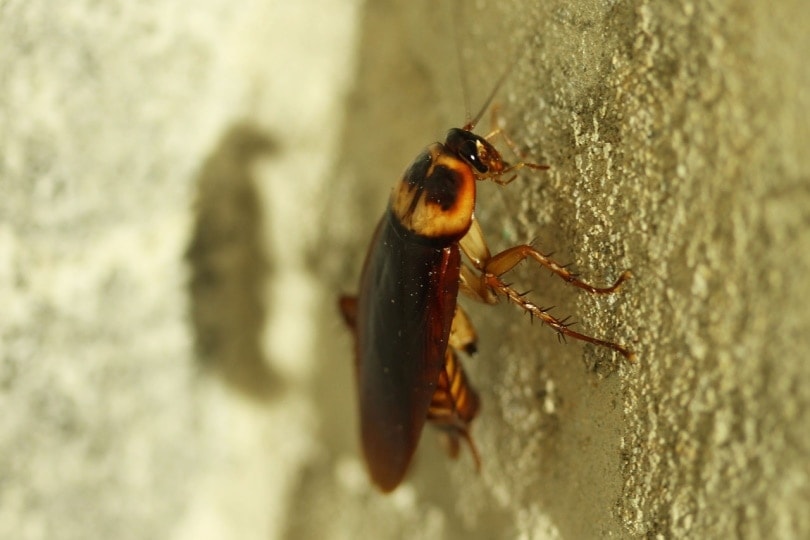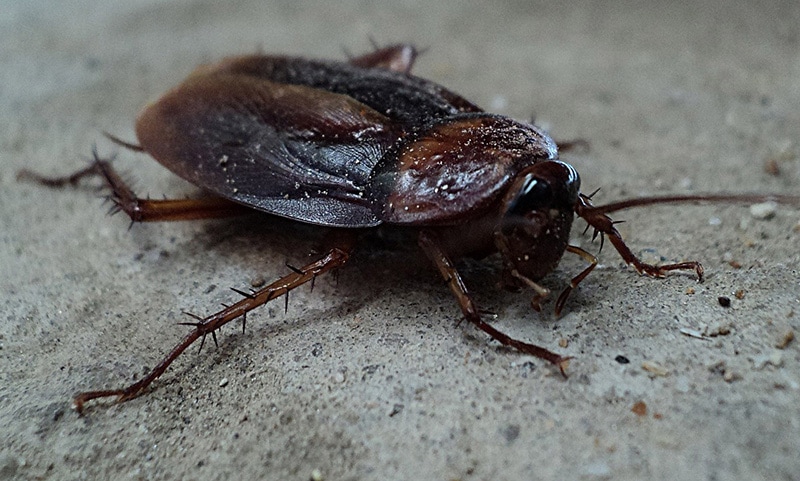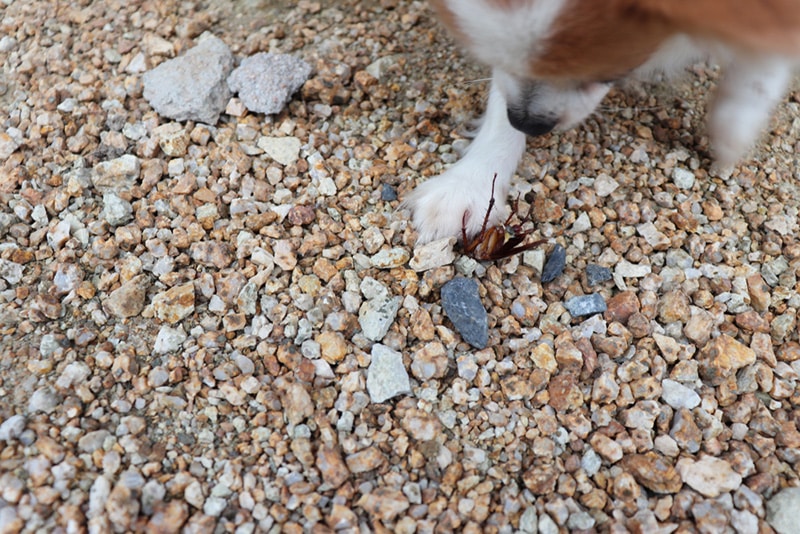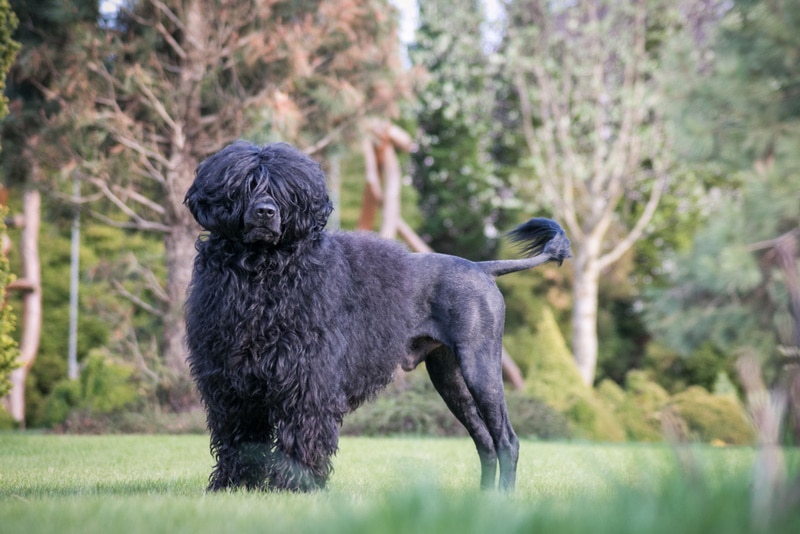My Dog Ate a Cockroach: Here’s What to Do (Vet-Reviewed)
Updated on

These fast creatures cause many pet parents to squirm and feel a little grossed out. There are various types of cockroaches depending on the area and climate where you live, but the German Cockroach is one of the most frequent ones encountered. Cockroaches are indeed one of the most common pests, ranking joint 3rd place with termites as the most common pest in North America, so it will be no surprise if you and your dog come across them.
Although dogs have been domesticated for thousands of years, many of their instincts used in the wild, such as catching prey, still remain active. Trapping and eating a roach is therefore a great temptation, a source of fun, and helps to stimulate their brains. Fortunately, eating a cockroach is not harmful or toxic to dogs, but this doesn’t mean you should let them either, as subsequent problems for your dog can occur.
Are Cockroaches Poisonous or Harmful to Dogs?
The cockroach itself is not poisonous to your dog. The concern with dogs eating a cockroach is due to bacteria and parasites the cockroach carries. Research shows they can carry over 30 different types of bacteria. They also contain parasites such as Physaloptera (the stomach worm) and the eggs of roundworms. Both these worms can be transmitted to your dog after they ingest the bug.
A further complication may occur if the cockroach is covered in a poisonous substance aimed at killing it. This opens the possibility for the same poisonous substances to be dangerous to your dog after they have consumed it. However, it’s likely your dog would have to eat numerous cockroaches containing the killer poison for it to affect them. That said, it is always wise to check with your veterinarian if you are suspicious or concerned about this.
Dogs can suffer from allergies which most commonly cause itchy skin signs. They can also suffer from food allergies which can also lead to gastrointestinal signs such as diarrhoea. It’s possible that dogs could react negatively to cockroach allergens, either in the environment or if ingested but little research has been done in this area.

What to Do if Your Dog Ate a Cockroach
If your dog has just enjoyed a cockroach as a quick and crunchy snack, little else but monitoring them needs to be done. It is unlikely a reaction will transpire, especially if it is only one roach. Monitoring is recommended though, due to the complications of the cockroach itself containing bacteria, a parasite, or a poison. Should problems arise, they can be treated by your veterinarian with medication and further monitoring.
- Don’t panic! It is extremely unlikely any issue or health problems will occur, and a dog eating a roach is not uncommon.
- Don’t react negatively to your dog or punish them. They are only following their instincts.
- Watch their digestion. Sometimes eating a cockroach can irritate the gastrointestinal tract, producing signs like nausea, diarrhea or loose feces, vomiting, and abdominal discomfort.
- Monitor them for the signs listed below, and should they show any of the more severe signs or if any continue after a day, contact your veterinarian for advice. If you are concerned at all, check in with your vet rather than sit and wait on any worries.
- Keep up to date with your dog’s vaccine and worming schedules.
- Take steps to limit the number of cockroaches around your home.
- You may also wish to keep the pet poison or poison control phone numbers and information on hand.

Signs to Watch for After Your Dog Ate a Cockroach
- Nausea
- Drooling and lip licking
- Dehydration
- Lack of appetite
- Coughing
- Diarrhea
- Vomiting
- Abdominal discomfort and/or guarding
- Tremors or shivers
- High temperature (fever)
- Restlessness
- Uncoordinated gait
Should I Let My Dog Eat Cockroaches?
As you now understand, while there is little harm in your dog eating the odd cockroach, it’s not ideal either. Roaches contain no nutritional value and hold small risks, as discussed. Therefore if it’s a behavior you do not want, there are steps you can take to reduce or prevent it.

How to Stop Your Dog From Eating Cockroaches
It may not be an activity you’ll be able to stop entirely, but there are many tips and tricks you can implement to prevent it as much as possible. Cockroaches aren’t actually attracted to dogs, but they are attracted to garbage, food, and dirty areas. Try these methods to help keep them away:
- Keep food sealed away in closed bags or containers.
- Clean up any spills or leftover food.
- After eating, remove and clean your dog’s bowl.
- Regularly clean their drinking/water bowl.
- Check for any gaps in the house or around the home. Keep these clean and block them off if possible.
- Clean and spray all surfaces and floors regularly with a pet-friendly disinfectant.
- Take out the trash. Do not have overflowing food and rubbish in trash cans in and around your home.
- Don’t leave dirty dishes lying around or in the sink.
- Fix any leaks, as cockroaches are partial to moisture!
- Natural repellents are available for cockroaches, which you may wish to consider using in your home.
- Provide toys and entertainment for your dog to satisfy their prey instincts and drive.
- If roaches have reached excessive levels, you may wish to call pest control.
- Use positive reinforcement techniques on your dog to help train them not to eat the pesky bugs.
Conclusion
Cockroaches are harmless bugs that look worse and creepier than they are, but they can carry parasites and bacteria. While generally considered safe for dogs to eat, it’s not recommended to let them munch away on these bugs. There are small risks associated with them, as they occasionally pass on these bacteria and parasites or cause a slight tummy upset. So it’s a pastime you may wish for your dog not to continue participating in, and hopefully the above tips will help prevent it! Always contact your veterinary practice if you have any concerns about your pet after they have eaten cockroaches.
See Also:
- My Dog Ate My AirPods: Here’s What to Do (Vet Answer)
- My Dog Ate Maggots: Vet Approved Facts, Risks & What to Do
Featured Image Credit: 1113990, Pixabay












